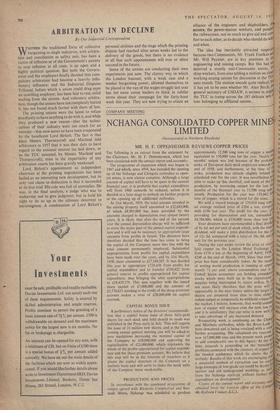ARBITRATION IN DECLINE
By Our Industrial Correspondent
WHEWER the traditional form of collective bargaining in single industries, with arbitra- tion and conciliation as safety nets, has been a victim of inflation or of the Government's anxiety to stop inflation at all costs, is an open and a highly political question. But both the Govern- ment and the employers finally decided that com- pulsory arbitration had become a heavily infla- tionary influence; and the Industrial Disputes Tribunal, before which a union could drag even an unwilling employer, has been laid to rest, amid wailing from the unions. And voluntary arbitra- tion, though the unions have not completely buried it, has not found much favour with them of late.
The printing unions were the latest to refuse steadfastly to have anything to do with it, and while they produced a new reason—that the techni- calities of their industry were too much for an outsider—this now seems to have been evaporated by the beneficent Lord Birkett. The fact is that since Messrs. Thorneycroft and Macleod told arbitrators in 1957 that it was their duty to have regard to the national interest (as laid down, or so the TUC assumed, by Messrs. Macleod and Thorneycroft), trust in the impartiality of any arbitration courts has been gravely weakened.
Lord Birkett's appointment as independent chairman at the printing negotiations has been hailed. as an interesting new developnient, but its only real claim to distinction is that it succeeded at its first trial. His role was full of anomalies. He was, in the final analysis, a judge who was to endeavour not to give judgment, but to hold his right to do so up as the ultimate deterrent to intransigence. A combination of Lord Birkett's personal abilities and the stage which the printing dispute had reached after seven weeks led to the delivery of the goods, but there is no evidence at all that such appointments will ever or often succeed in the future.
Some of the unions are conducting their own experiments just now. The clumsy way in which the London busmen, with a weak case and a weaker bargaining power, allowed themselves to be placed in the van of the wages struggle last year has led some union leaders to think in subtler terms about their campaign for the forty-hour week this year. They are now trying to create an alliance of the engineers and shipbuilders, t miners, the power-station workers, and possibi) the railwaymen, not so much to give aid and colt fort to each other, as to decide who should do wtO and when.
The idea has inevitably attracted suspici' because two Communists, Mr. Frank Foulkes afi Mr. Will Paynter, are in key positions in engineering and mining camps. But this has deterred a stoutly anti-Communist union, t shop workers, from also tabling a motion on dos working among unions for discussion at the TL next month. The motion sounds quite radical, by it has yet to be seen whether Mr. Alan Birch, general secretary of USDAW, is serious in urgill the TUC to tramp across the 185 delicate sets' toes belonging to affiliated unions.


































 Previous page
Previous page